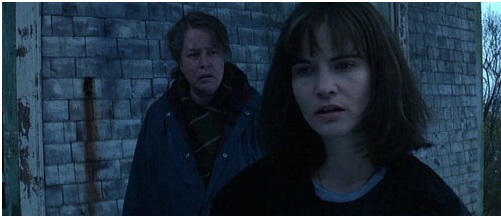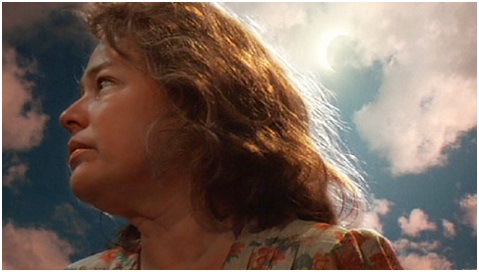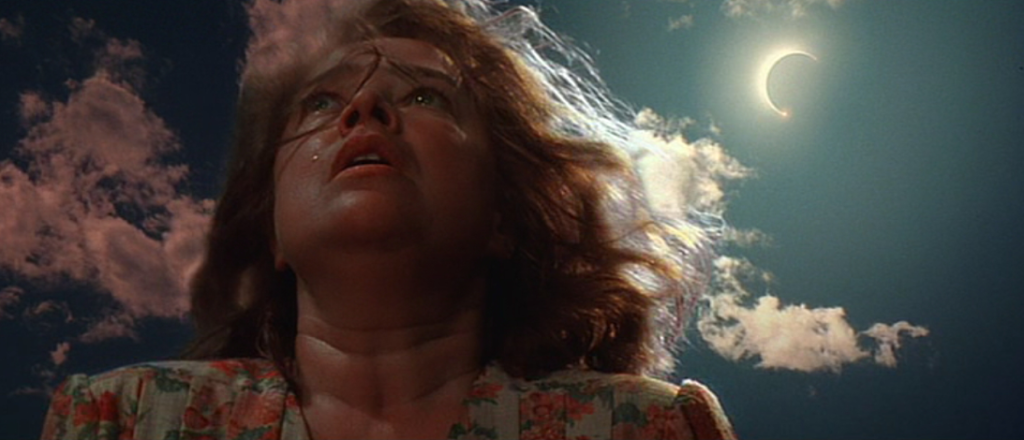“It’s a depressingly masculine world we live in, Dolores.”

DOLORES CLAIBORNE has always been the most wrongly unheralded Stephen King adaptation. Despite the immense talent in front of the camera and behind it, for some reason it never became either the box office juggernaut like Stand by Me, or the underground cult classic The Shawshank Redemption. And that’s never made much sense, considering DOLORES CLAIBORNE is far superior to both those admittedly great films. Maybe it’s because DOLORES CLAIBORNE doesn’t offer up the kind of typical feel-good ending that allows audiences to let loose the proverbial breath they’d been holding in ever since the prison bus arrived at those wrought iron gates, nor does it offer up the bright and fuzzy recollection of a childhood spent at the sides of best friends while whistling down railroad tracks. What DOLORES CLAIBORNE instead offers is an unrelenting darkness and a folding back of forgotten time, layer by layer, to reveal the disgusting and depraved memories that lie beneath. Yes, we’re in Stephen King territory, but it’s not about horrific creatures in the dark. It’s about horrific human beings and what they are capable of doing to people they claim to love. It’s about the horror of memory, time, betrayal, and the kinds of weaknesses that make humanity flawed and intriguing.
Dolores St. George (Kathy Bates) is a loving but no-nonsense, bull-headed, and forthright woman who says what’s on her mind and hardly minds what she says. She lives on Little Tall Island, Maine, with her husband, Joe (the slimily good David Strathairn) and their young daughter, Selena (Ellen Muth of Dead Like Me). Joe drinks too much and seems as bull-headed as his wife, but otherwise, life isn’t too bad. After all, Dolores has just gotten a job working for the very rich Vera Donovan (Judy Parfitt), and though the money isn’t rolling in, she receives an amount that’s worthy enough to put in the bank every week for Selena’s eventual college tuition.
What many would consider a pretty ideal life, living in picturesque New England and right on the beautiful Atlantic Ocean, comes to a screaming halt one particular afternoon when Joe’s had a bit too much to drink and misinterprets Dolores’ playful chiding as an attack on his manhood – and stunted ability to provide for his family. After swinging a large piece of firewood directly into Dolores’ spine, sending her shaking into a nearby seat, he goes back to watching television as if nothing ever happened. And what could have ended with an angry husband’s act of dominion over his wife instead ends with an intensified act of reciprocation, in which Dolores smashes a glass over his head and threatens him with an ax. An understanding between man and wife is temporarily forged, but Dolores knows she’s got to get out. She just has to save a bit more money and she’ll be free to flee with Selena… until the day she goes to the bank and discovers that Joe has cleaned out her account. Dolores sees her future, as well as Selena’s, come crashing down. All the hope that was stored away in that account is gone, and she must now risk resigning herself to a permanent future where Joe is abusive to her…and a sexual predator to their own daughter.

When Dolores breaks down in Vera’s presence and confesses having discovered that Joe has been molesting their daughter, Vera shows the closest thing to humanity she will exhibit during the entire film. With restrained tears in her eyes, she tells Dolores, “Men die every day. Sometimes the brakes in their cars fail on their way home from their mistresses’. They die, leaving their wives their money.” The message is clear: Some men do not deserve to live. Joe is one of them.
Dolores makes a choice to no longer exist as a woman in a man’s world. She decides to take action. During a much-ballyhooed eclipse, Dolores sets a trap, weighing Joe down with too much food and too much liquor. Once he’s drugged from the spread, she confronts him. She tells him she knows about the bank account…and what he’s been doing to Selena. He chase hers, and she leads him to an open mineshaft located not too far from their property. Still drunk, he plummets through the ancient wood to the darkness, and his death.
Many years later, Selena is grown and gone, and Dolores still maintains duties at Vera Donovan’s house, though this time as a nursemaid. Vera, an invalid imprisoned in a wheelchair, is disgusted with what she has become. She tells Dolores she hates the smell of being old, and she just wants to be done. She throws herself from her wheelchair and tumbles down the stairs, badlyinjuring herself but not finishing the job. She begs Dolores to put her out of her misery. Dolores nearly does with a marble rolling pin before she’s interrupted by the mailman. With a wheeze, Vera dies anyway, and through her own actions, but for the second time in her life, Dolores will be tied to a murder of someone close to her. It will bring a daughter home (now played by Jennifer Jason Leigh) and force her to confront the memories she’s long repressed, and it will cause an old nemesis to begin circling again, this time determined not to let Dolores get away.
DOLORES CLAIBORNE very much showcases the most twisted kind of sisterhood, but one that’s also incredibly powerful, and in a strange way, comforting. Dolores, Selena, and Vera are all victims of the men in their lives. Dolores suffers physical and emotional abuse, Selena is abused by her father, and later on, sexually exploited by her editor/boss, and Vera is imprisoned for years in a loveless marriage with an unfaithful and distant husband. Vera’s own adage, “Sometimes being a bitch is the only thing a woman has to hang onto,” is eventually passed from her, to mother, to daughter, and all three gradually recite the motto. And yeah, it’s easy to point to a film like DOLORES CLAIBORNE and call it a “women empowerment” film, all based on the fact that women play the primary roles, but to make such an assumption would cheapen the care that went into the careful crafting of the story. It’s not just the obviousness of, say, Dolores being roughed up by her husband; she’s also disregarded by Mr. Pease, the local bank’s manager (Shawshank‘s Bob Gunton), whose silence basically concedes to Dolores’ claims that Joe had no rightful access to her account. She’s the receptor of drunken, shotgun-firing, pick-up-truck driving rednecks who tear across her property late at night calling her names, smashing her windows, and telling her she’s going to the electric chair. Not to mention she’s been the target of John Mackey’s decades-long attempts to see her pay for Joe’s death, for which he knows she is responsible, and who seems to be pursuing her with an added exuberance – desperate to finally charge this woman who got away with it.
And it’s not just how Dolores is treated, but also the toll her laborious life has taken on her body. When Mackey requests a hair sample from Dolores’ head, she wryly states, “Go ahead, I ain’t entering any beauty pageants this week.” Because Dolores was never meant for that kind of life, her physical attributes notwithstanding. Because she’s not a womanly woman. Though she is loving and fiercely maternal, she has a man’s resolve and his masculinity. Her years of wintry, outdoor laundry has given her a man’s ruined hands and stolen any good looks she might have had. She did not live the idealized life of a woman, or a man for that matter. She lived her life as a broken soul – isolated, persecuted, and alone.

Following the death of her husband, Dolores changes her name back to the maiden Claiborne. After rightfully (?) killing Joe to save her and Selena from a life of torment, she has rediscovered her womanhood and her independence, though not without consequences. Perhaps most telling, during the last scene that Dolores and Vera will share in the past, where the death of Joe becomes an inevitability, Vera icily tells her, “It’s a depressingly masculine world we live in, Dolores.”
Though the film details the redemption of our three primary women, don’t assume that the few men present are painted as weak, imbecilic, or otherwise inferior. That would be an easy out, and the novel and script are smarter than that. However, that doesn’t mean the men aren’t your antagonists, because they most certainly and they’re present in both time periods: abusive Joe the husband in the past, and John Mackey the machine-like lawman in the present. And while John Mackey is only doing his job, he’s a magnificent bastard from the start. His obsession with charging Dolores for her crimes, either for Joe or possibly Vera, has completely taken over his existence. He is rueful, snide, and never lets a nasty comment go by unsaid. And though I earlier mentioned that the men are not depicted as inferior simply because they are men, it must be a very emasculating feeling for John Mackey that seemingly an entire town knows Dolores offed her own husband and he was never able to prove it. To look at it from his perspective, a murderer walks free down the same streets he does. He knows she did it, and can’t do anything about it, and years upon years of that knowledge festering in his mind has corrupted his decency. He’s not villainous for the sake of being villainous; to be fair, he’s the product of living in an unjust world just like our women leads. He’s got the right to feel the way he does, but we, the audience, won’t consider his viewpoint because we stand with Dolores from the start. The only decent male character is John C. Reilly’s Constable Frank Stamshaw, though his eagerness to stay out of Dolores’ and Mackey’s warpath leaves him gutless and childlike.He’s an authority figure, but he shies in Dolores’ presence, afraid of what she might do or say.
Five years after winning Best Actress for her deranged portrayal of Annie Wilkes in MISERY, Kathy Bates revels in another Kingly woman riddled with dark secrets and an unburied past. She’s not afraid to look unkempt and unglamorous. She wears every year of her life in her winkled face, and her gray hair swirls above her in the cold winter winds. Her eyes are the most haunting part, as they contain a deadness that only comes from too much life. She is someone who has spent the better part of her years with only one person: her employer, the irascible Vera Donovan. Dolores’ tenure at the Donovan house gradually matriculates from housekeeper to house nurse during Vera’s elderly years, feeding her, cleaning her bedpans, and lifting her in and out of bed. The pay is shit, and Dolores is too old, but the two women remain together because they’re the only person each has. It’s a sad life for both of them, but it’s the life each was given.
Jennifer Jason Leigh is probably the most underrated actress of our time. She has shown an intimidating versatility throughout her career, leaping from mile-a-minute news reporter in the screwball comedy THE HUDSUCKER PROXY to outright psycho in SINGLE WHITE FEMALE. She is that very rare actress who possesses the ability of her male counterparts Daniel Day Lewis and Gary Oldman to disappear, chameleon-like, into her roles. Her performance here is career-best, forced to play a woman living in complete denial as to what happened in her youth, hoping that pills and booze and a career grilling prominent men for their truths will help to bury the real truth, should it ever work its way up into the recesses of her mind. She is given an awful lot of emotional baggage off which to play, and naturally she does so with impressive ease because she’s Jennifer Jason Leigh.

Speaking of underrated, David Strathairn plays the perfect kind of slime ball. Relegated to supporting work for most of his career, he plays wonderfully against type and paints himself as the cancer tearing through the St. George household. He’s rotten to his family, but in very different ways, and there’s an especially disgusting undercurrent within his “relationship” that he shares with his daughter. Not only has he been molesting her for an unknown amount of time, but he’s been giving her gifts– like jewelry that once belonged to his mother – as if Selena were a romantic conquest. It’s sick and depraved, and subtly makes you wonder just what on earth is going on inside his mind. It’s an intriguing way to realize this character: how easy would have it been to paint Joe as a leering, grinning monster, without guilt or regret? But that would be the cheap way out, and the filmmakers know it. In the flashback scene where Joe forces his daughter’s hand inside his open jacket, he isn’t that grinning monster with a deviant face. He’s very worried, and even terrified,that he’s become this man willing to do this to his own daughter, and that he seems unable or unwilling to stop.
The hardest job on the film belongs to Ellen Muth, who is tasked with displaying a wide range of emotions. She plays a girl who goes from happy-go-lucky to emotionally destroyed overnight. Like many victims of sexual molestation, she is filled with anger, humiliation, and guilt. It rockets across her mind almost daily, where it gets to the point that she tries to spend as much time away from home as possible, instead staying at a nearby hotel where she’s employed. And in the scene earlier mentioned in which Joe forces his daughter’s hand, Hackford lets the camera linger on her young face. The moment Selena’s hand makes contact with her father, you can literally see her die. All the fear disappears from her face and her eyes become immediately hard. For this scene, Muth utilized a tactic she learned after spending time with victims of familial molestation: that every time it happened to one of them, they pretended to be a bird, or a stone, or a cloud – something that allowed them to leave their body and become this other thing so they did not have to experience this moment of horror.

After Judy Parfitt auditioned for the role of Vera Donovan, Kathy Bates reportedly turned to director Hackford, and exclaimed, “Who was THAT?” With such a performance, it’s easy to see why. Parfitt’s role as “stone-cold bitch” Vera Donovan is stone-cold good, and her transformation from uppity, bitchy socialite into bed-ridden invalid is even more impressive than Kathy Bates’ own. She is the catalyst that both dooms and saves the entire St. George family; her presence systematically seals each of their fates. It’s because of her that Joe dies, that Dolores becomes hunted and vilified, and that Selena is rescued from but also becomes forever haunted by her tormenting father. The relationship she shares with Dolores is pitch perfect; although she may have served as Dolores’ torturous employer for many years, she was also her savior – the most twisted mentor/protégé pairing that ever existed.

Christopher Plummer’s obsessive and ruthless take on Detective John Mackey is a wonderful foil to Bates’ Claiborne. The present version of his homicide character proudly claims that he’s never been wrong (“not when it counted”), and he makes it known he was able to close every single one of his investigations…except one. Guess which. The scene he shares with Leigh during the climax – one in which Dolores, for the first and last time in the film, remains meekly quiet – exercises the kind of skill we look for when we go to see serious-minded cinema. These two titans go at it with all the unleashed fury and vitriol they can muster, and it’s completely awing to watch them trade blows and keep swinging. Honestly, it’s one of the best scripted and acted scenes there could ever be.
There’s one more performance in the film that needs to be mentioned: that of Nova Scotia, standing in for the fictional Little Tall Island. Though the surroundings are often dark and foreboding, and the elements harshly cold, there is no denying its natural beauty. From the rolling water to the American architecture and iconography, Nova Scotia works so eerily well as a New England stand-in that for years I believed the film had actually been shot there.
Director Taylor Hackford injects DOLORES CLAIBORNE with cold blues in an attempt to make his audience freeze to death. New England is known for its extreme winters, and he captures remarkably well. To watch this film is to stand outside in the dead of winter. Wintry landscape does wonders for a film where you want your audience to feel isolated, stark, somber, and hopeless. He wants you to feel like that because that’s how Selena feels, and that’s how Dolores has been living for the last twenty years. In her version of Little Tall Island following her murder of Joe and the departure of her daughter, it’s a merciless winter all the time.
The scenes involving the eclipse which embrace Joe’s murder are exceedingly complex, combining elements of green screen, in-camera effects, and CGI. While the look of the sky in the last few minutes before the sun is covered borders on artificiality, the look is still somehow appropriate: it helps that Little Tall Island is briefly transformed to this foreign looking place dripping with vibrant and cartoon colors… because Dolores’ world is changing. After she finishes the job of killing her husband to spare both her life as well as Selena’s, Dolores realizes she will never be the same – that what she’s done is going to be with her for the rest of her life, and it will define her as a person, both from her daughter’s point of view as well as the town’s.

It’s always difficult to tell a story that takes place in two different time periods, but Hackford not only pulls it off, he finds way to show that past and present are colliding. Scenes in which present-day Dolores begins recollecting will feature a character from the past enter through a door behind her, or in the form of a voice off screen, and it never fails to be jarring. The construction of this design seems more appropriate for a stage performance (which, coincidentally, Dolores Claiborne has since become), so to see it used in a film can sometimes take you by surprise. They serve as a constant reminder that the past can never stay buried, and it constantly threatens to surface when you least expect it.
DOLORES CLAIBORNE is not a feel-good movie, not even at the end when the redemption for our characters becomes prominent. This is a film where no one smiles, unless it’s a rueful one. And it’s a film where the cold, dark surroundings of wintertime wraps itself around you with frigid arms, refusing to let go, your only relief being the flashback sequences filled with dazzling sunlight and warm breezes… during which a well-known and well-liked man named Joe St. George is inside doing horrible, unspeakable things. It’s an ugly film about ugly things, and even when mother and daughter are emotionally reunited at the end, the current status of their relationship is still left largely ambiguous. (“I don’t want to lose you again,” Selena tells her mother, instead of, “I won’t lose you again.”) We want and need for Dolores and Selena to reconcile, and to have the relationship they deserve, but decades of secrets and pain are a lot to overcome, so by film’s end, the audience can only hope they both find the peace for which they long.

Tags: Bob Gunton, Christopher Plummer, Danny Elfman, David Strathairn, Dolores Claiborne, Drama, Ellen Muth, Eric Bogosian, Horror, Jennifer Jason Leigh, John C. Reilly, Judy Parfitt, Kathy Bates, New England, Nova Scotia, Stephen King, Taylor Hackford, Tony Gilroy


I’m not sure how I got down a rabbit hole to this movie description. I don’t usually put comments to a website, but I felt compelled. Your description is spot on. This is really one of my all time favorite movies. Not because of the sadness of the plot, but the acting/filming. The back and forth is amazing, the segues are so natural. Every actor was perfect for their role. Your description of this movie is fantastic, and clearly doesn’t need any reassuring regarding your evaluation/opinion. But, I wanted to give a nod that someone sees this film exactly the same way. It deserves much more credit than given.